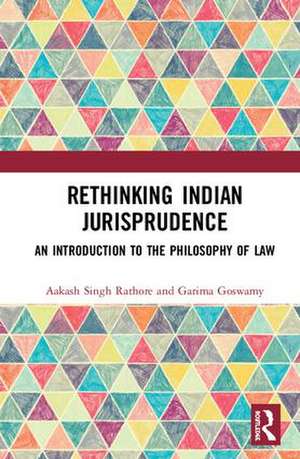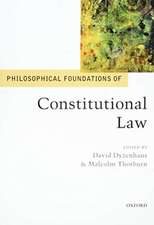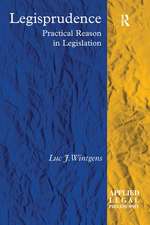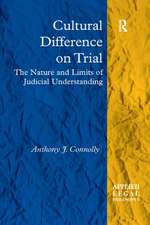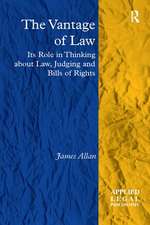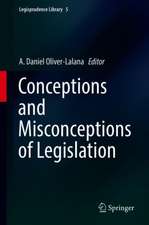Rethinking Indian Jurisprudence: An Introduction to the Philosophy of Law
Autor Aakash Singh Rathore, Garima Goswamyen Limba Engleză Hardback – 6 feb 2018
This book addresses these foundational questions about the law in general, and seeks to reorient our thoughts to the specific nature of law in India, the India of today, and the possible India of the future.
This volume:
- covers relevant foundational elements, concepts and questions of the discipline;
- brings the uniqueness of Indian Philosophy of Law to the fore;
- critically analyzes the major theories of jurisprudence;
- examines legal debates on secularism, rationality, religion, rights and caste politics; and
- presents useful cases and examples, including free speech, equality and reservation, queer law, rape and security, and the ethics of organ donation.
| Toate formatele și edițiile | Preț | Express |
|---|---|---|
| Paperback (1) | 256.02 lei 6-8 săpt. | |
| Taylor & Francis – 18 dec 2020 | 256.02 lei 6-8 săpt. | |
| Hardback (1) | 762.81 lei 6-8 săpt. | |
| Taylor & Francis – 6 feb 2018 | 762.81 lei 6-8 săpt. |
Preț: 762.81 lei
Preț vechi: 1101.99 lei
-31% Nou
Puncte Express: 1144
Preț estimativ în valută:
145.96€ • 159.05$ • 122.100£
145.96€ • 159.05$ • 122.100£
Carte tipărită la comandă
Livrare economică 23 aprilie-07 mai
Preluare comenzi: 021 569.72.76
Specificații
ISBN-13: 9781138630314
ISBN-10: 1138630314
Pagini: 228
Dimensiuni: 138 x 216 x 19 mm
Greutate: 0.38 kg
Ediția:1
Editura: Taylor & Francis
Colecția Routledge India
Locul publicării:Oxford, United Kingdom
ISBN-10: 1138630314
Pagini: 228
Dimensiuni: 138 x 216 x 19 mm
Greutate: 0.38 kg
Ediția:1
Editura: Taylor & Francis
Colecția Routledge India
Locul publicării:Oxford, United Kingdom
Cuprins
Preface. Acknowledgments. Introduction Part I Elements of the Philosophy of Law 1. Law and Morality 2. Christian Sources of Secular Law 3. The Cannibal’s Guide to Jurisprudence 4. Law and Rationality 5. Wronging Rights? Part II Towards an Indian Philosophy of Law 6. Towards an Indian Philosophy of Law 7. From Dharmashastra to Modern Hindu Law 8. The Persistence of Caste 9. The Politics of Shariat 10. Gandhi’s Affirmation of Law 11. Ambedkarite Jurisprudence Part III Applying Legal Philosophy to Indian Cases 12. Free Speech and All India Bakchod 13. Equality and Reservation 14. Queering Law 15. Rape and Security: A Buddhist Vantage Point 16. The Ethics of Organ Donation 17. Indian Supreme Court Jurisprudence: Five Exemplary Cases. Conclusion. Bibliography. Index
Notă biografică
Aakash Singh Rathore specializes in Legal Theory (Post-Doctorate) and Comparative Constitutional Law (LL.M.), and is currently Visiting Professor at the Centre for Philosophy, Jawaharlal Nehru University, New Delhi, India. He is also an International Fellow of the Center for Ethics and Global Politics in Rome, Italy. His publications include Plato’s Labyrinth: Sophistries, Lies and Conspiracies in Socratic Dialogues (2018), Indian Political Theory: Laying the Groundwork for Svaraj (2017) and Indian Political Thought: A Reader (co-edited with Silika Mohapatra, 2010), also published by Routledge.
Garima Goswamy has taught Philosophy at Lady Shri Ram College, St Stephen’s College, Laxmibai College and Hansraj College, University of Delhi, and at BML Munjal University, India. Currently she works in the risk-consulting industry.
Garima Goswamy has taught Philosophy at Lady Shri Ram College, St Stephen’s College, Laxmibai College and Hansraj College, University of Delhi, and at BML Munjal University, India. Currently she works in the risk-consulting industry.
Recenzii
‘Legal philosophy has long been dominated by Western ideas and leading figures. This important new book surveys these concepts and contributions, and then brings them into conversation with indigenous Indian thought. The result is fascinating and opens up radically new perspectives for jurisprudence.’
Thom Brooks, Professor and Chair of Law and Government and Dean at Durham Law School, UK
‘Finally a book which rights the wrongs inflicted upon "Jurisprudence" in Indian Law schools. Bridging classic western legal philosophy with Indian intellectual traditions and praxis, Rethinking Indian Jurisprudence will inaugurate a new pedagogical practice in law’
Kalpana Kannabiran, Professor and Director, Council for Social Development, Hyderabad, India
‘A lively, provocative, and accessible book, which encourages the reader to think on and explore further the mystery and miracle of legal philosophy, otherwise alien to the learning of modern law in India.’
Upendra Baxi, Emeritus Professor of Law, University of Warwick, UK and Distinguished Professor of Law, National Law University, Delhi, India
Thom Brooks, Professor and Chair of Law and Government and Dean at Durham Law School, UK
‘Finally a book which rights the wrongs inflicted upon "Jurisprudence" in Indian Law schools. Bridging classic western legal philosophy with Indian intellectual traditions and praxis, Rethinking Indian Jurisprudence will inaugurate a new pedagogical practice in law’
Kalpana Kannabiran, Professor and Director, Council for Social Development, Hyderabad, India
‘A lively, provocative, and accessible book, which encourages the reader to think on and explore further the mystery and miracle of legal philosophy, otherwise alien to the learning of modern law in India.’
Upendra Baxi, Emeritus Professor of Law, University of Warwick, UK and Distinguished Professor of Law, National Law University, Delhi, India
Descriere
What is law? What is the source of law? What is the law for? How does law differ from other norms or codes of conduct? What is the difference between law and morality? What is the difference between moral and legal obligation? This book addresses these foundational questions about the law in general, and seeks to reorient our thoughts to the specific nature of law in India, the India of today, and the possible India of the future. It covers relevant questions; brings the uniqueness of Indian Philosophy of Law to the fore; critically analyses major theories of jurisprudence; examines legal debates on secularism, religion, rights, caste politics; and presents useful examples.
